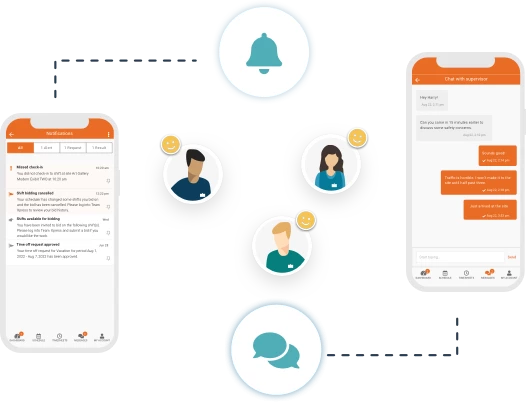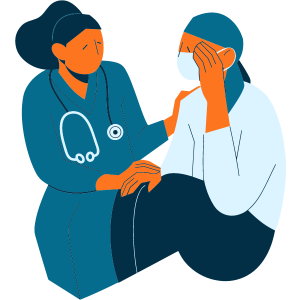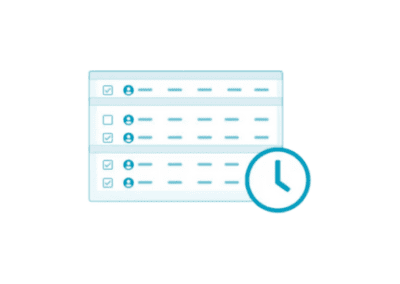It’s fair to say that good communication skills are essential to most jobs. In home healthcare, prioritizing communication is crucial and should receive appropriate attention. Communication is so important in home healthcare as it ensures quality of care, and improves client experience.
Home healthcare workers need to be active listeners, compassionate communicators and skilled reporters. All of these communication elements contribute to the success of home healthcare organizations.
The Goals of Communication in Home Healthcare 
The goal of any home health care agency is to ensure that the needs of their patients are being met. Communication goals in home healthcare help clients deal with the emotions that come with life changes. These goals aim to assist clients in managing complex emotions. Clients may experience a range of emotions due to changes in their lives.
The goal is to support clients in navigating these emotions effectively. Whether someone is in the hospital, injured, ill, or adjusting to a new life where they depend on their caregivers.
These situations can be challenging for individuals. They may feel vulnerable and uncertain. They may need extra support and care from their caregivers. This is where the importance of communication in home healthcare comes in is highlighted.
Your care team’s ability to listen, and support a patient through their treatment is what sets them apart. Strong, positive communication can help a patient trust their carer, and feel comfortable in their company and care. It can also help patients’ families feel confident that their loved ones are in good hands. Communication in home healthcare is the foundation of a positive relationship between carer, client, and family members.
The Impact of Poor Communication in Home Healthcare
In order to fully understand the importance of communication in home healthcare, it can help to examine the impact of poor communication. The impact of poor communication in home healthcare can reach as far as patients, carers and home healthcare agencies.
The impact of poor communication for patients
When it comes to patients receiving home care, poor communication has been proven to compromise their health. First, poor communication in home healthcare can lead to patients receiving the wrong treatment. This can include medications, tests or assistance.
As you can imagine, a patient receiving the wrong medication or treatment can be extremely detrimental to their health. According to research by medical safety experts at CRICO Strategies, 7,000 of 23,000 medical malpractice lawsuits could be attributed to communication failures.
Another impact of poor communication in home healthcare for patients is a lack of trust and comfort in their carer. If a carer fails to show strong communication skills, a patient can sense that, and might hold back potentially vital information from their carer.
If a patient feels that their carer does not listen attentively, or doesn’t explain things clearly, communication will ultimately break down. This can lead to poor patient progression and even patient regression. It might also lead to avoidable accident or injury.
The impact of poor communication for carers
One of the most common weak points in communication in home healthcare is at the changeover of shifts or hand off of patients. Research by the Joint Commission found that 80% of serious medical errors were the result of miscommunication between caregivers during patient handovers.
If a carer fails to communicate key details around patient care, the new carer might not be able to meet the needs of the patient. If this is not caught on time, the new carer might be penalised for poor care standards which would have been avoided with effective communication.
Communication from employers in home healthcare is also critical to success. Carers rely on strong communication to do their job, so without that, they cannot be successful.
The impact of poor communication on healthcare agencies 
As we mentioned above, 7,000 medical malpractice suits of 23,000 investigated could be attributed to communication failures. Well, those communication failures resulted in $1.7 billion in malpractice costs and almost 2,000 preventable deaths.
This is something that all agencies would like to avoid. When communication is poor across the board, agencies experience poor patient outcomes, resulting in fewer referrals. They also experience poor employee engagement which leads to absenteeism and struggles with recruiting. Poor communication in home healthcare can be absolutely devastating to agencies when not addressed.
How to Improve Communication in Home Healthcare
There is no one size fits all when it comes to improving communication in home healthcare. However, there are several strategies that can be adopted to improve communication in your agency.
Use the RELATE model
As we mentioned above, hand over is one of the main weak points of communication in home healthcare. In order to ensure more effective communication, you might make use of the RELATE model for handovers and all other critical information;
- Reassure
- Explain
- Listen
- Answer questions
- Take action
- Express appreciation
Educating your carers on this communication model, and others like it can be extremely beneficial. Carers are not always taught communication skills, as their education generally focuses on patient care and other vital information.
They often aren’t aware of basic communication requirements. As an employer, take it upon yourself to educate your staff and keep communication at top of their minds. Education is not the only essential step here though, you must also provide your team with the resources to be able to communicate well.
Consider all Methods of Communication
Home health carers communicate in more ways than one. Yes, more often than not they’re verbally communicating, and that is critical. However there are patient files, care plans, important documents and other written/digital records that need communicating effectively.
Create communication tips, templates, guidelines and clear rules for written communications such as patient files and other necessary paperwork. Part of that also involves the filing/organization of these documents so include that in your guidelines too!
Update your Outdated Communication Systems

The Celayix workforce management suite offers in-app, encrypted messaging to ensure patient and carer privacy as well as improving communication between employees and their employers. Carers can report directly to their HQ on any critical updates, sign off on patients, and record the care they have given.
Our software has been updated in line with EVV requirements to ensure that your agency in compliant in terms of providing care and keeping records of it. If you’d like to learn how Celayix can help you improve your home healthcare communication, get in touch today!







